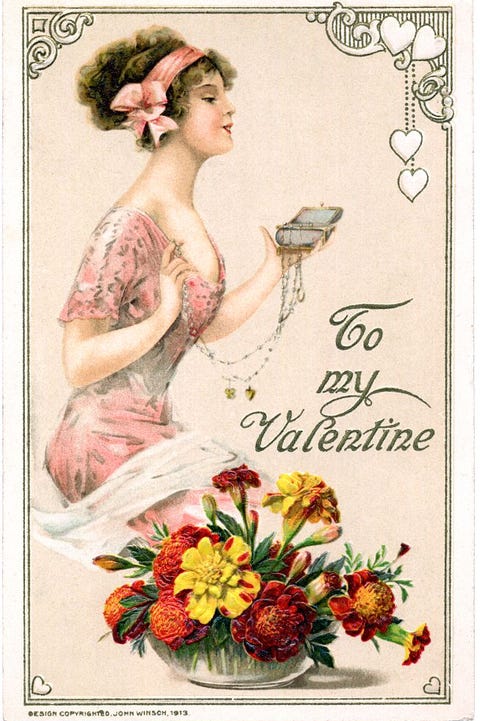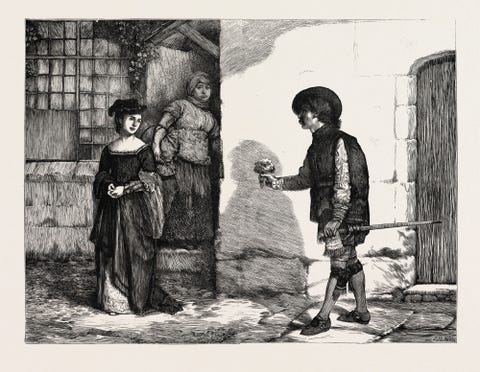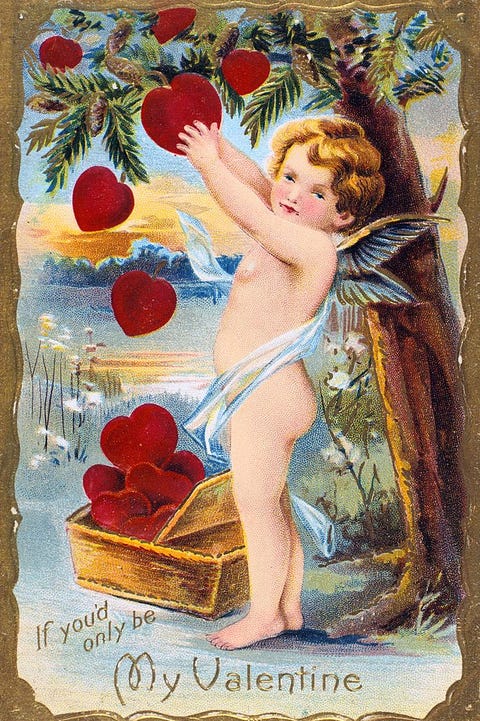Valentine’s Day probably has you thinking of flowers, chocolate, and heart-eye emojis, but before you start crafting Valentine’s Day cards and searching for the best gifts for your Valentine (and galentine!), you might be wondering why we actually celebrate on February 14. While it may be tempting to think of Valentine’s Day as a modern holiday meant just for indulging our shopping and sugary impulses, this day of heart-shaped festivity actually has an ancient—and fascinating—origin story…or rather, mystery.
So how did February 14 first come to be considered the day of love? And what’s the origin of Valentine’s Day—and why have its romantic themes persisted to this day? Oh, and while we’re at it, where does the word “Valentine” come from?
As it turns out, nobody really knows the true history behind this storied holiday, nor do any of the theories completely check out. Even historians find themselves arguing over the exact traditions from which the present-day holiday takes inspiration.
But we’re sharing as much as we know about the topic, including the murky origin of Valentine’s Day and its interesting history. Its backstory—though not confirmed—is actually quite dark and even a bit bloody. Strange traditions, pagan rituals, and grisly executions abound. If you’re not faint of heart, though, you’ll enjoy learning about everything we’ve compiled here. Who knows? It might even inform your Valentine’s Day wishes!
Where does the word Valentine come from?
The day is named, of course, for St. Valentine—we all know that by now. But why? Who is this mysterious Valentine?
According to The New York Times, it’s possible that the love-filled holiday is based on a combination of two men. There were, after all, two Valentines executed on February 14 (albeit in different years) by Emperor Claudius II, reports NPR. It’s believed that the Catholic Church may have established St. Valentine’s Day in order to honor these men, who they believed to be martyrs. What’s more, it’s possible that one of these men, Saint Valentine of Terni, had been secretly officiating weddings for Roman soldiers against the emperor’s wishes, making him, in some eyes, a proponent of love.
Another story involves the practice of writing love letters to your Valentine. It’s said that St. Valentine wrote the first “valentine” greeting to a young girl he tutored and fell in love with while he was imprisoned for the crimes outlined above. According to The History Channel, before his death, he wrote her a letter signed “From your Valentine,” which remains a commonly used phrase to this day.
Others believe that St. Valentine’s Day was actually designated by Pope Gelasius I in order to replace the ancient Roman festival Lupercalia, a celebration of fertility dedicated to the Roman god of agriculture, Faunas, and Roman founders Romulus and Remus.
The feast of debauchery fell around the same time and involved a ritual where an order of Roman priests ran naked through the streets, “gently slapping” women with the blood-soaked hides of sacrificed animals (yes, really), which they believed promoted fertility. Following this flagellation was a tradition in which men selected women’s names at random from a jar to decide who would remain together for the next year, or, if they fell in love, they’d marry.
However, a University of Kansas English professor, the late Jack B. Oruch, had a different theory, notes the Times: Through research, he determined that the poet Geoffrey Chaucer linked love with St. Valentine for the first time in his 14th-century works “The Parlement of Foules” and “The Complaint of Mars.” Therefore, Oruch claimed that Chaucer invented Valentine’s Day as we know it today. (At the time of Chaucer’s writing, February 14 also happened to be considered the first day of spring in Britain, because it was the beginning of birds’ mating season—perfectly appropriate for a celebration of affection.)
Why do we celebrate Valentines Day?
Whether or not Chaucer can be fully credited, it is true that he and fellow writer Shakespeare popularized the amorous associations surrounding the day. Soon, people began penning and exchanging love letters to celebrate Valentine’s Day, and by the early 1910s, an American company that would one day become Hallmark began distributing its more official “Valentine’s Day cards.” Flowers, candy, jewelry, and more followed, and the rest, of course, is history.
What part does Cupid play on Valentine’s Day?
It’s not all about St. Valentine! Cupid—that winged baby boy often seen on Valentine’s Day cards and paraphernalia—is another symbol of this love-filled holiday, and it’s easy to understand why. In Roman mythology, Cupid was the son of Venus, goddess of love and beauty. He was known for shooting arrows at both gods and humans, causing them to fall instantly in love with one another. While it’s unclear exactly when Cupid was brought into the Valentine’s Day story, it’s certainly clear why.









